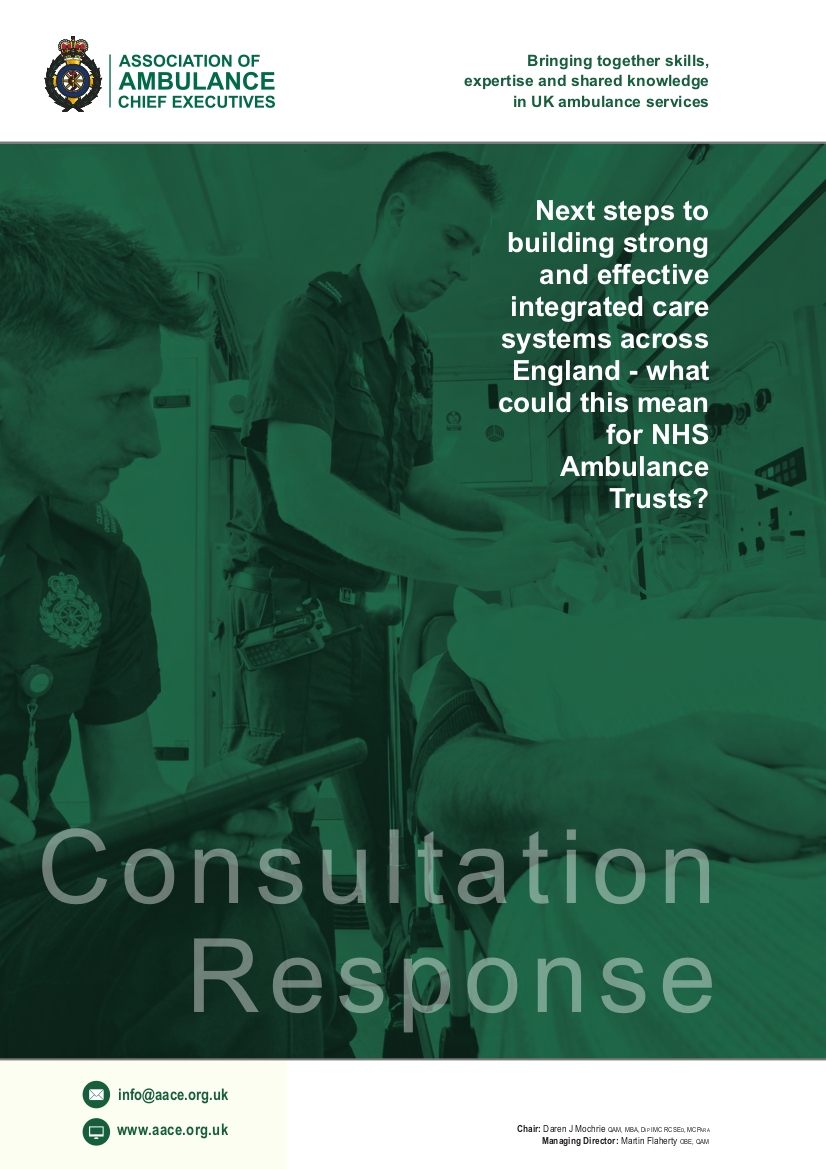NHS England and NHS Improvement (NHSEI) have launched a consultation process inviting discussion about how Integrated Care Systems (ICSs) could be embedded in legislation or guidance. This is with the aim of delivering against the NHS Long Term Plan (LTP) in supporting greater collaboration between partners in health and care systems.
The Association of Ambulance Chief Executives (AACE) has consulted with the ten NHS ambulance trusts in England to provide this response to the consultation on behalf of the sector.
With respect to the two options proposed for Integrated Care Systems (ICSs), there is widespread agreement from ambulance trusts that these should be given a statutory footing from 2022 as corporate NHS bodies with commissioning responsibilities.
The main proviso for this would be that there should be no duplication of regulatory activity, accountability, or function with other remaining statutory bodies such as NHSEI or the Care Quality Commission (CQC).
Arrangements for membership and governance will need to be defined and transparent, with clear principles and guidance that ensures all partners within an ICS are considered equally. ICS bodies will need to demonstrate their competence and effectiveness in commissioning the range of service provision, especially from providers such as ambulance services, that span more than one ICS.
AACE has endeavoured to reflect the common position of its members on how other elements of the consultation proposals may impact on or present opportunities for the ambulance role in delivering high quality patient care and integration of services.
ICSs should be able to make good use of the regional knowledge and experience of their ambulance service to support identification of best practice, learning and transformation in implementing the aims of the LTP to move care closer to home, and safely reduce avoidable conveyance to emergency departments (EDs). There are opportunities for using evidence-based pathways flexed to local need more widely across regions e.g. frailty pathways.
Ambulance services need to be strategic and local partners if they are to collaborate with optimal effect. In addition, they need to be considered alongside community providers to benefit from the risk share arrangements which will come into effect under ICSs.
Working locally at place level and as a regional provider is what ambulance trusts do now, across the country, but it is not without its challenges, and we would welcome clear guidance within the integrated care proposals on how this can be managed more realistically and effectively.
The integration of workforce planning across an ICS (and regions) is more important than ever, with many professions in short supply and capacity being outstripped by the requirements in each partner’s workforce. The ICS should play a role in ensuring lack of clinical supply does not result in a local market economy and inflated costs for providers.
The Integrated Care proposal for provider collaboration potentially offers greater opportunity for ambulance services to engage within and across ICSs, which would help all partners better understand variation in access to services and outcomes due to geography, race or socio-economic factors.
Stronger emphasis on collaboration needs to require the embedding of tangible means (forums, processes, systems) to share best practice and harmonise clinical pathways within ICSs and across the wider regional footprint. This would encourage the adoption of the most clinically effective and efficient models and reduce unwarranted variation or postcode inequalities.
Learning from the COVID-19 pandemic response, we know that there are opportunities to improve productivity, efficiency, and costs when certain aspects of service provision can be done collaboratively, at scale, across ICS footprints. The solution to many performance issues within systems can be better addressed through provider collaboration and partnership working than by focussing on individual providers in isolation; particularly so for the ambulance sector, where performance can be so significantly impacted by wider system issues.

